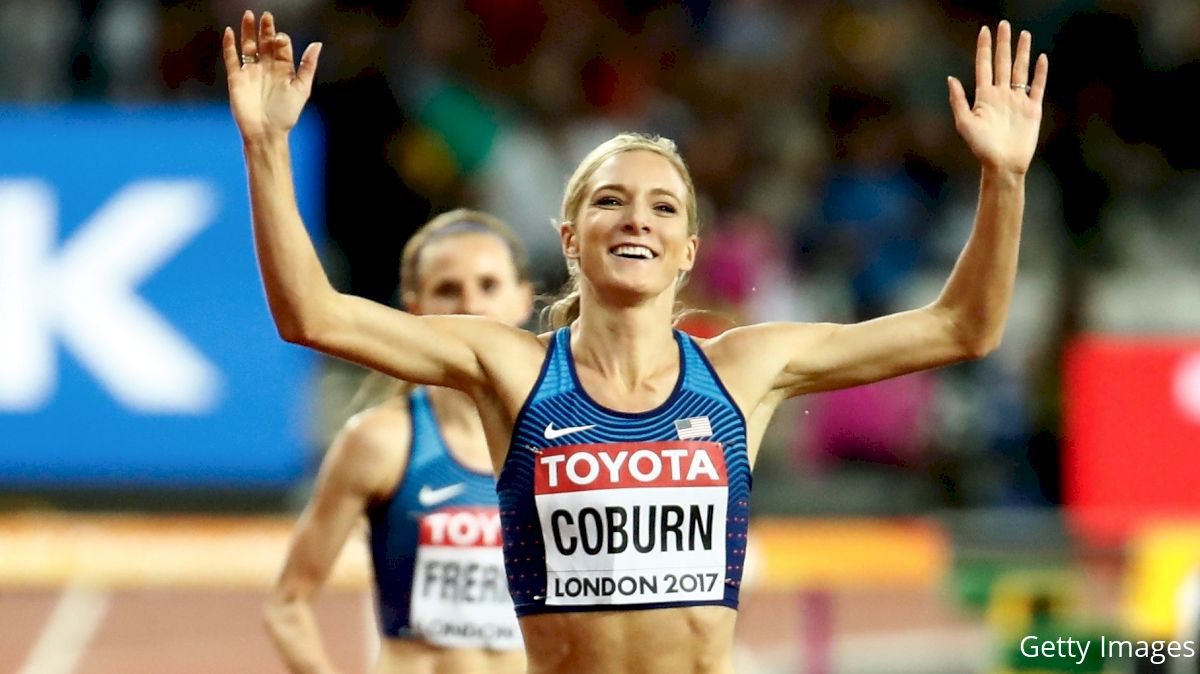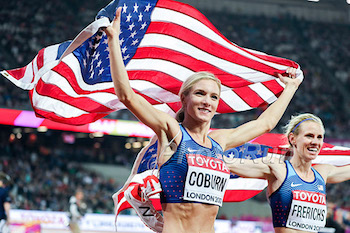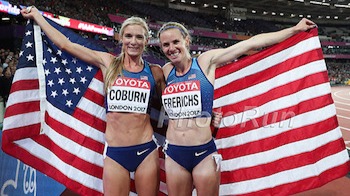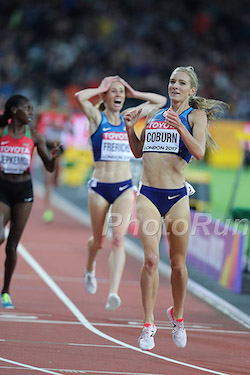2017 IAAF World ChampionshipsAug 12, 2017 by David Monti
Emma Coburn 'Speechless' After World Steeplechase Victory
Emma Coburn 'Speechless' After World Steeplechase Victory
Emma Coburn of the United States reacts after winning the women's 3K steeplechase at the 2017 IAAF World Championship.

By David Monti, @d9monti
(c) 2017 Race Results Weekly, used with subscription
LONDON (11-Aug) -- Six-time USA steeplechase champion Emma Coburn made history here tonight at London Stadium on the eighth day of the IAAF World Championships, becoming the first-ever American woman to win a world steeplechase title. In the process, the 26 year-old from Boulder, Colo., set a championships record of 9:02.58 and broke her own American record by five seconds.
"I'm speechless," Coburn told reporters immediately after the race while wrapped in an American flag.
Just two steps behind Coburn, her USA teammate Courtney Frerichs of Portland, Ore., claimed the silver medal, running nearly as fast (9:03.77), beating reigning world champion Hyvin Jepkemoi of Kenya by just 26/100ths of a second.
The result was shocking to some, given that traditional steeplechase power Kenya had four women in the final, and that Bahrain's Ruth Jebet --the Kenyan-born world record holder-- was also in the race. But for Coburn a medal was always a possibility, and she went into the race with the belief that she could contend.
"I thought on a perfect day I could sneak in for a medal," said Coburn, who won the bronze at the 2016 Rio Olympics. "You know, Joe (Bosshard, her fiance and coach) kept telling me that anything was possible, and kept reminding me of the hard workouts I had done. I've been really healthy this year, and have been running well and training well."
 The race got off to a strange start when after the first full lap Kenya's Beatrice Chepkoech, fourth at the 2016 Rio Olympics, failed to enter the water jump diversion and had to go back to avoid being disqualified. Remarkably, Chepkoech eventually caught up to the field which was led by Jebet, her Bahraini teammate Winfred Mutile Yavi, Jepkemoi and the world junior record holder Celliphine Chepteek Chespol of Kenya. Chepkoech would later fall, but still managed to get back into contention again.
The race got off to a strange start when after the first full lap Kenya's Beatrice Chepkoech, fourth at the 2016 Rio Olympics, failed to enter the water jump diversion and had to go back to avoid being disqualified. Remarkably, Chepkoech eventually caught up to the field which was led by Jebet, her Bahraini teammate Winfred Mutile Yavi, Jepkemoi and the world junior record holder Celliphine Chepteek Chespol of Kenya. Chepkoech would later fall, but still managed to get back into contention again.
"I saw Beatrice miss that first water," recalled Coburn. "I think she came back so she wouldn't get DQ'd which props to her for thinking that through and not just continuing."
The pace was solid through the first kilometer (3:02.74). Coburn never led, but she stayed with the front group, which was led by Jebet. Frerichs, the 2016 NCAA steeplechase champion, was part of that group and was running well within herself.
"Jerry (Schumacher) and Pascal (Dobert) told me to go with Emma," Frerichs said, referring to her two coaches at the Nike Bowerman Track Club. "They sat me down yesterday. They said, you looked great in that prelim. You're super fit. We've been practicing K's at three-flat, so I know that sub-9:10 was a possibility."
With three laps to go, six women were still in contention: Jebet, Chespol, Chepkoech (despite falling), Jepkemoi, Coburn and Frerichs. The pace was fast, 6:03.60 through two kilometers, but Coburn wasn't hurting, at least not yet.
 "The whole race I just felt strong, controlled and powerful, and kept waiting and waiting for it to feel bad and it never did," Coburn said.
"The whole race I just felt strong, controlled and powerful, and kept waiting and waiting for it to feel bad and it never did," Coburn said.
On the backstretch with a lap and a half remaining, Jebet accelerated and created a gap over the field, but it was short-lived. At the bell, the teenager Chespol had been dropped, and five women raced down the backstretch. All five were together as they approached the final water jump. Coburn, probably the world's best woman at leaping water barrier, knew she had an edge.
 "Joe just told me that last 150, that last water jump, be really powerful," Coburn explained. "Use all the good form I know I can do. And so, I saved that gear and that last water jump. I think I had a good water, and I came out feeling strong; that last hundred just kicked. I was kind of waiting for someone to come up and steal it from me, no one did."
"Joe just told me that last 150, that last water jump, be really powerful," Coburn explained. "Use all the good form I know I can do. And so, I saved that gear and that last water jump. I think I had a good water, and I came out feeling strong; that last hundred just kicked. I was kind of waiting for someone to come up and steal it from me, no one did."
Coburn stormed down the homestretch, pulling away from Jepkemoi over the final barrier while Frerichs was able to catch, and pass, the petite Kenyan.
"I felt like something special was happening, so I just went for it in the last lap," Frerichs marveled.
Chepkoech finished fourth in 9:10.45, and Jebet was fifth in 9:13.96.
For Coburn, who was already a global medalist, winning a medal was always a potential reality. But for Frerichs, getting on the podium was surreal.
"I kind of feel like I'm dreaming; someone might need to pinch me," she said.
Bad luck struck American Robby Andrews in the first of two 1500m semi-finals. Andrews, who was disqualified from the Rio Olympic 1500m when he stepped over the rail and ran in the infield, suddenly stopped here tonight with about 480 meters left in the race, hopping on one foot before coming to a stop in the infield where he knelt down in frustration. A severe cramp struck his right calf, and he couldn't continue.
"I felt like I was running well," Andrews told Lewis Johnson of NBC Sports. "I gave everything I had. Unfortunately, my body wasn't cooperating. It was going to tear if I ran anymore."
Ahead of Andrews, Kenya's Elijah Manangoi and Asbel Kiprop finished one-two in 3:40.10 and 3:40.14, respectively. Behind them, Norway's Filip Ingebrigtsen, Bahrain's Sadik Mikhou, and Spain's Adel Mechaal claimed the other three automatic qualifying spots. Manangoi, who has the 2017 world-leading time of 3:28.80, felt a little awkward running so slowly.
"You know, It's really hard because it's championships, you know?" Manangoi told reporters. He continued: "It's a very tactical race, but we have to accept because it's the world championships, not the Diamond League. It's really a slow pace; I don't like a slow race."
The second heat was faster and was won by the Czech Republic's Jakub Holusa in 3:38.05. Also automatically advancing to Sunday's final were Kenya's Timothy Cheruiyot, Poland's Marcin Lewandowski, Britain's Chris O'Hare, and Morocco's Fouad El Kaam. Two time Olympic medalist, Nick Willis of New Zealand, and Johnny Gregorek of the United States were the two time qualifiers finishing sixth and seventh, respectively. Willis clearly struggled in the final meters.
"I lived to fight another day," Willis told the media. "It didn't feel great, but I think I'll enjoy having an extra day's rest before the final. I was just a bit overextended."
Nearly all of the medal favorites advanced to the final of the women's 800m, except for Brenda Martinez of the United States (third, heat 3) and Joanna Jozwik of Poland (fifth, heat 3). The "Big Three" of Caster Semenya of South Africa, Francine Niyonsaba of Burundi, and Margaret Wambui of Kenya, all advanced easily, as did the USA's Ajee' Wilson and Charlene Lipsey, and Canada's Melissa Bishop.
"I am here to do my best and make it safe from the semi-finals," Niyonsaba told IAAF interviewers after winning the third and final heat in 2:01.11. "I do not know what to expect in the final - slow or a fast pace. But I am here to win, not to lose."
Britain's Lynsey Sharp finished fourth in the second heat, but was disqualified for shoving American Charlene Lipsey in the homestretch from behind (she simply appeared to lost her balance due to exhaustion). But the British team protested, and Sharp was reinstated and allowed to advance to Sunday's final. However, Sharp was given a yellow card for "unsportsmanlike conduct," the IAAF said.
(c) 2017 Race Results Weekly, used with subscription
LONDON (11-Aug) -- Six-time USA steeplechase champion Emma Coburn made history here tonight at London Stadium on the eighth day of the IAAF World Championships, becoming the first-ever American woman to win a world steeplechase title. In the process, the 26 year-old from Boulder, Colo., set a championships record of 9:02.58 and broke her own American record by five seconds.
"I'm speechless," Coburn told reporters immediately after the race while wrapped in an American flag.
Just two steps behind Coburn, her USA teammate Courtney Frerichs of Portland, Ore., claimed the silver medal, running nearly as fast (9:03.77), beating reigning world champion Hyvin Jepkemoi of Kenya by just 26/100ths of a second.
The result was shocking to some, given that traditional steeplechase power Kenya had four women in the final, and that Bahrain's Ruth Jebet --the Kenyan-born world record holder-- was also in the race. But for Coburn a medal was always a possibility, and she went into the race with the belief that she could contend.
"I thought on a perfect day I could sneak in for a medal," said Coburn, who won the bronze at the 2016 Rio Olympics. "You know, Joe (Bosshard, her fiance and coach) kept telling me that anything was possible, and kept reminding me of the hard workouts I had done. I've been really healthy this year, and have been running well and training well."
 The race got off to a strange start when after the first full lap Kenya's Beatrice Chepkoech, fourth at the 2016 Rio Olympics, failed to enter the water jump diversion and had to go back to avoid being disqualified. Remarkably, Chepkoech eventually caught up to the field which was led by Jebet, her Bahraini teammate Winfred Mutile Yavi, Jepkemoi and the world junior record holder Celliphine Chepteek Chespol of Kenya. Chepkoech would later fall, but still managed to get back into contention again.
The race got off to a strange start when after the first full lap Kenya's Beatrice Chepkoech, fourth at the 2016 Rio Olympics, failed to enter the water jump diversion and had to go back to avoid being disqualified. Remarkably, Chepkoech eventually caught up to the field which was led by Jebet, her Bahraini teammate Winfred Mutile Yavi, Jepkemoi and the world junior record holder Celliphine Chepteek Chespol of Kenya. Chepkoech would later fall, but still managed to get back into contention again."I saw Beatrice miss that first water," recalled Coburn. "I think she came back so she wouldn't get DQ'd which props to her for thinking that through and not just continuing."
The pace was solid through the first kilometer (3:02.74). Coburn never led, but she stayed with the front group, which was led by Jebet. Frerichs, the 2016 NCAA steeplechase champion, was part of that group and was running well within herself.
"Jerry (Schumacher) and Pascal (Dobert) told me to go with Emma," Frerichs said, referring to her two coaches at the Nike Bowerman Track Club. "They sat me down yesterday. They said, you looked great in that prelim. You're super fit. We've been practicing K's at three-flat, so I know that sub-9:10 was a possibility."
With three laps to go, six women were still in contention: Jebet, Chespol, Chepkoech (despite falling), Jepkemoi, Coburn and Frerichs. The pace was fast, 6:03.60 through two kilometers, but Coburn wasn't hurting, at least not yet.
 "The whole race I just felt strong, controlled and powerful, and kept waiting and waiting for it to feel bad and it never did," Coburn said.
"The whole race I just felt strong, controlled and powerful, and kept waiting and waiting for it to feel bad and it never did," Coburn said.On the backstretch with a lap and a half remaining, Jebet accelerated and created a gap over the field, but it was short-lived. At the bell, the teenager Chespol had been dropped, and five women raced down the backstretch. All five were together as they approached the final water jump. Coburn, probably the world's best woman at leaping water barrier, knew she had an edge.
 "Joe just told me that last 150, that last water jump, be really powerful," Coburn explained. "Use all the good form I know I can do. And so, I saved that gear and that last water jump. I think I had a good water, and I came out feeling strong; that last hundred just kicked. I was kind of waiting for someone to come up and steal it from me, no one did."
"Joe just told me that last 150, that last water jump, be really powerful," Coburn explained. "Use all the good form I know I can do. And so, I saved that gear and that last water jump. I think I had a good water, and I came out feeling strong; that last hundred just kicked. I was kind of waiting for someone to come up and steal it from me, no one did."Coburn stormed down the homestretch, pulling away from Jepkemoi over the final barrier while Frerichs was able to catch, and pass, the petite Kenyan.
"I felt like something special was happening, so I just went for it in the last lap," Frerichs marveled.
Chepkoech finished fourth in 9:10.45, and Jebet was fifth in 9:13.96.
For Coburn, who was already a global medalist, winning a medal was always a potential reality. But for Frerichs, getting on the podium was surreal.
"I kind of feel like I'm dreaming; someone might need to pinch me," she said.
ANDREWS OUT IN 1500M SEMI-FINALS
Bad luck struck American Robby Andrews in the first of two 1500m semi-finals. Andrews, who was disqualified from the Rio Olympic 1500m when he stepped over the rail and ran in the infield, suddenly stopped here tonight with about 480 meters left in the race, hopping on one foot before coming to a stop in the infield where he knelt down in frustration. A severe cramp struck his right calf, and he couldn't continue.
"I felt like I was running well," Andrews told Lewis Johnson of NBC Sports. "I gave everything I had. Unfortunately, my body wasn't cooperating. It was going to tear if I ran anymore."
Ahead of Andrews, Kenya's Elijah Manangoi and Asbel Kiprop finished one-two in 3:40.10 and 3:40.14, respectively. Behind them, Norway's Filip Ingebrigtsen, Bahrain's Sadik Mikhou, and Spain's Adel Mechaal claimed the other three automatic qualifying spots. Manangoi, who has the 2017 world-leading time of 3:28.80, felt a little awkward running so slowly.
"You know, It's really hard because it's championships, you know?" Manangoi told reporters. He continued: "It's a very tactical race, but we have to accept because it's the world championships, not the Diamond League. It's really a slow pace; I don't like a slow race."
The second heat was faster and was won by the Czech Republic's Jakub Holusa in 3:38.05. Also automatically advancing to Sunday's final were Kenya's Timothy Cheruiyot, Poland's Marcin Lewandowski, Britain's Chris O'Hare, and Morocco's Fouad El Kaam. Two time Olympic medalist, Nick Willis of New Zealand, and Johnny Gregorek of the United States were the two time qualifiers finishing sixth and seventh, respectively. Willis clearly struggled in the final meters.
"I lived to fight another day," Willis told the media. "It didn't feel great, but I think I'll enjoy having an extra day's rest before the final. I was just a bit overextended."
FAVORITES ADVANCE TO WOMEN'S 800M FINAL
Nearly all of the medal favorites advanced to the final of the women's 800m, except for Brenda Martinez of the United States (third, heat 3) and Joanna Jozwik of Poland (fifth, heat 3). The "Big Three" of Caster Semenya of South Africa, Francine Niyonsaba of Burundi, and Margaret Wambui of Kenya, all advanced easily, as did the USA's Ajee' Wilson and Charlene Lipsey, and Canada's Melissa Bishop.
"I am here to do my best and make it safe from the semi-finals," Niyonsaba told IAAF interviewers after winning the third and final heat in 2:01.11. "I do not know what to expect in the final - slow or a fast pace. But I am here to win, not to lose."
Britain's Lynsey Sharp finished fourth in the second heat, but was disqualified for shoving American Charlene Lipsey in the homestretch from behind (she simply appeared to lost her balance due to exhaustion). But the British team protested, and Sharp was reinstated and allowed to advance to Sunday's final. However, Sharp was given a yellow card for "unsportsmanlike conduct," the IAAF said.